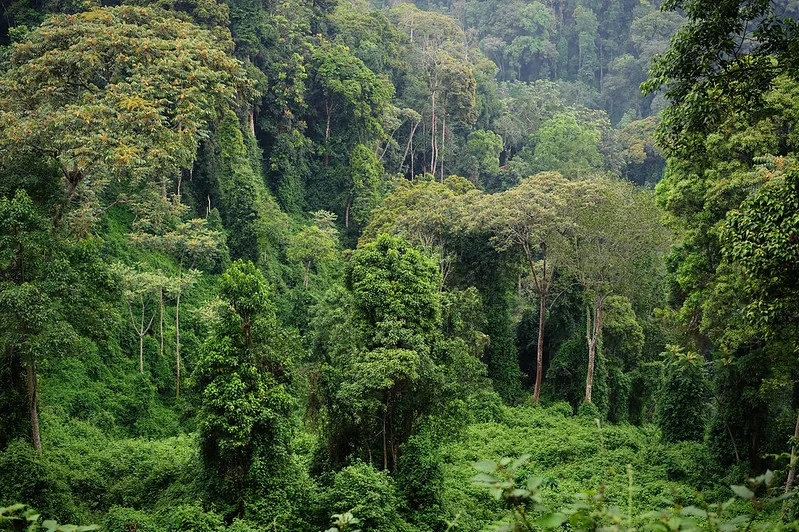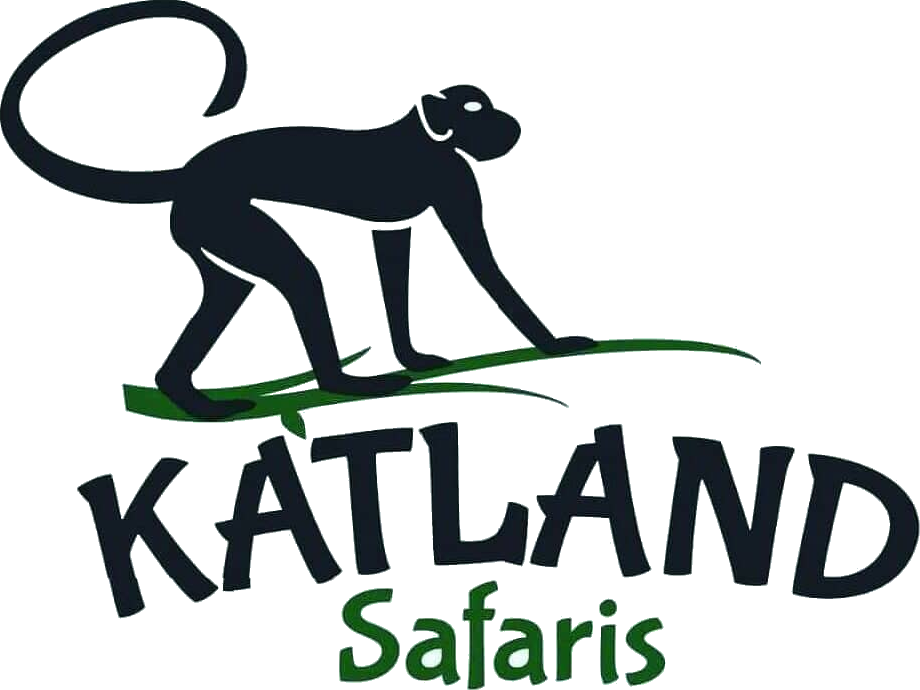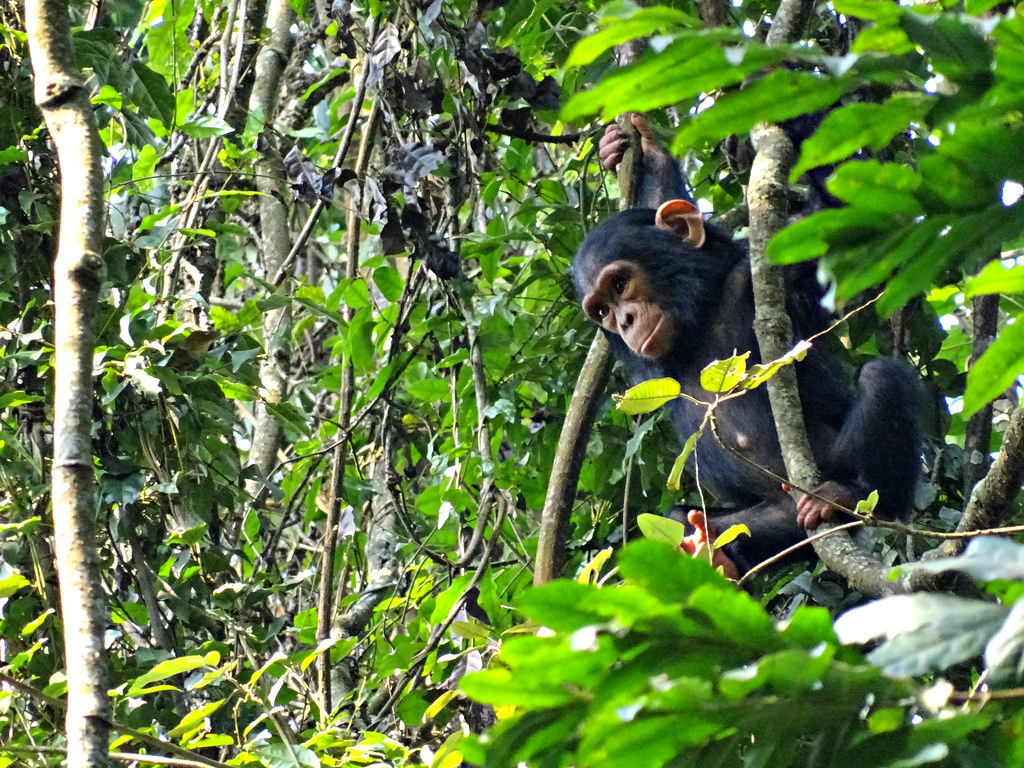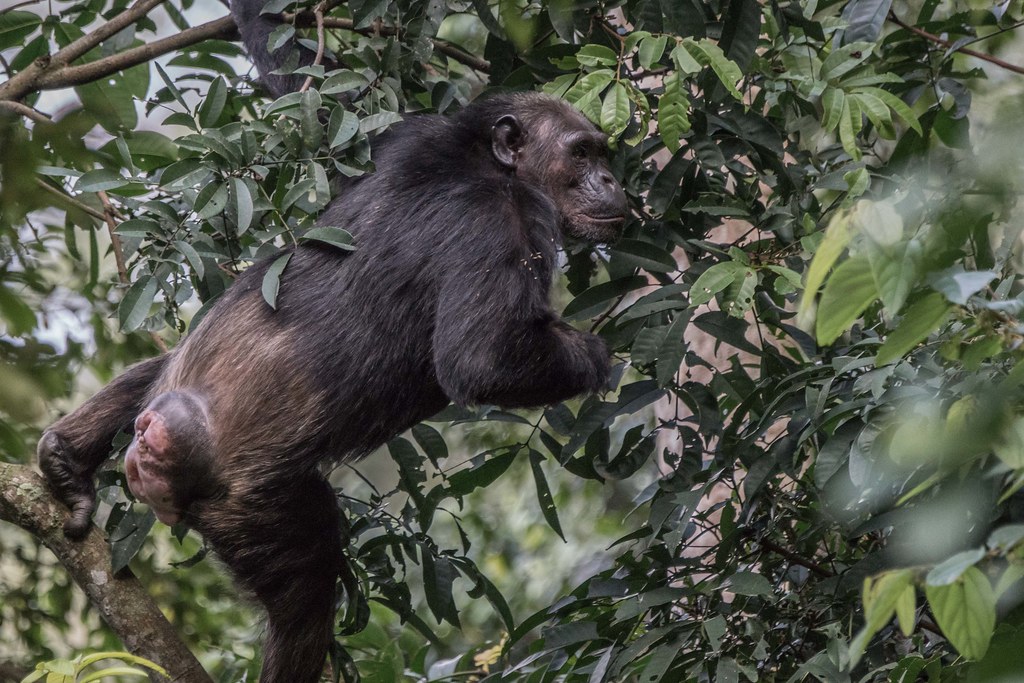How is safety and security guaranteed during chimpanzee trekking in Nyungwe National Park?
How safe is traveling among chimpanzees in Nyungwe National Park? Rwandan tourists visit Nyungwe National Park for chimpanzee trekking. Rwanda prioritizes chimpanzee conservation and hiking to grow its tourist sector.
Chimpanzee hiking in Nyungwe is safe thanks to Rwandan government regulations. A popular tourist activity in Rwanda’s southern Nyungwe Forest National Park is chimpanzee trekking, which also includes thirteen other primates. Rwanda’s largest Montane forest has 300 bird species, including local and international species, tree plants, reptiles, amphibians, and more.
Nyungwe forest chimpanzee trekking
All trekkers must attend a briefing at 5:00 am to start monkey trekking in Nyungwe Forest National Park. A group of guides will explain the constraints and methods for monitoring chimpanzees at the briefing in Kitabi, Gisakura, or Uwinka. The escorts guiding the guests communicate with trackers assigned to identify the chimpanzees’ last known position during the gathering.
The exercise may take two to six hours, depending on accustomed families’ locations. After finding them, you spend an hour watching the chimps play, eat, mate, and do whatever they want.
Apes are curious and cautious around people, but they will never touch them. After seeing the chimpanzees, the challenge is worth it. Visitors may view additional primates in the park’s main building after an hour with the apes. Not up to the challenge? Try the Cyamudongo chimpanzee family, which is easier to traverse.
Chimpanzee trekking permits in Rwanda
Visitors may hike habituated chimpanzees using Rwanda Development Board chimpanzee permits. A copy of the Rwandan government-owned authorization will be sent upon payment. Safaris need this. Meet the park wardens at 5:00 a.m., and the duty warden will examine your documentation and take permission.
Chimpanzees are continually migrating around the Cyamudongo woodland and Uwinkat, so spotting them when trekking in Nyungwe is not certain. For chimpanzee hiking, the Rwanda Development Board issues a one-person permit.
Chimpanzee permits need a minimum age of 15; your passport details will prove your age when you reserve. Price list for chimpanzee trekking:
Ten bucks for East Africans
Foreigners must have a work visa and pay $60.
Non-resident foreigners: $90
Citizens of Rwanda 5,000 RwF
The Rwandan chimpanzee trekking permit excludes numerous items. This lets eight or 10 people track a chimpanzee family. The permit fee includes park access, habituated chimpanzees, security, and an hour with them. Personal purchases, transportation, and hotel are excluded.
The chimpanzee permit limits the number of walkers each day to guarantee safety.
Chimpanzee habituation permit production rate?
Two habituated chimpanzee groups live in Nyungwe National Park, which issues 20 permits daily. Since only a few licenses are produced daily, tourists contemplating chimpanzee walks should secure them three months in advance.
Rebate for Rwanda’s chimpanzee permit: Habituated groups regularly move, making Nyungwe National Park a dicey place to watch them. If you don’t spot chimpanzees, you’ll receive 75% off your permit.
Nyungwe Forest National Park chimpanzee walks: regulations
Since chimpanzees remain wild after habituation, overwhelming them during tracking is unnecessary. Chimpanzees and hikers must follow the rules to be safe.
Here are Nyungwe chimpanzee hiking guidelines:
All flash photography is prohibited, so turn off your flash before engaging with the chimpanzees.
You always focus on your lead guide. They have years of experience trekking chimps safely and know the finest spots.
You can only spend an hour with the chimpanzees after finding them.
Chimpanzees are restless and continuously moving, so don’t corner them for photos.
You must be 15 to go chimpanzee trekking. Children under 15 are prohibited.
You cannot eat or drink with chimpanzees.

Always keep eight meters or more from the apes.
Remove rubbish from Nyungwe National Park and dig a 30-centimeter hole and cover it to use the bathroom. This will maintain the park tidy for everyone.
Whenever possible, avoid touching chimpanzees.
Unhealthy people should not go on the chimpanzee trek.
To sneeze or cough, look away from the chimps and cover your nose and mouth.
Nyungwe Chimpanzee Trekking packing list.
If you’re not dressed properly, following chimpanzees in Cyamudongo and Nyungwe woods might be uncomfortable. See here for chimpanzee hiking safari attire. Bring just neutral colors like green, brown, and khaki. Camouflage is dangerous because of its military connection, the fact that blue attracts tsetse flies, and the fact that black absorbs heat quickly.
Long sleeves: Packing extra garments is the best way to protect yourself from the country’s unpredictable weather and the jungle journey. Lighter ones are OK because you’ll be wearing undershirts. Long-sleeved shirts protect against bug bites. You may bring undershirts and long-sleeved shirts after finding the apes. Rwandans cherish decency, therefore dress well.
Good pants are recommended for the Nyungwe National Park chimpanzee trekking safari. Wet pants are heavy and burdensome, so avoid trekking in them, especially in the rainy season. Instead, wear lightweight trousers.
When trekking with chimpanzees, use sturdy hiking boots. Blisters may be avoided with waterproof, ankle-length, well-fitting boots.
Bring gardening gloves to prevent cuts and scratches when traveling with the chimpanzees through the bush.
Wear thick, long socks to remain warm during rapid temperature changes. Hike with your pants tucked into your socks to keep insects out.
Bring a thick sweater, waterproof poncho, and raincoat in case the weather changes abruptly.
Things to Bring to Nyungwe Forest National Park
The first thing vacationers ask is what to carry on a safari, and many pack too much or too little worthless goods. This list includes goods you should bring for chimpanzee trekking:
A good camera, enough memory card capacity to save all your safari photos, a solid tripod, extra batteries (yes, you can charge them), a variety of lenses, a rain- and dust-proof case, and lens cleaners.
Bring all your hiking supplies in a water-resistant daypack.
Refillable collapsible water bottle. Since you don’t know how long the journey would be, pack more than one liter of Rwanda’s clean bottled water.
Trek emergency first aid kit. Keep the kit packed and carry your prescriptions. Local guides usually carry a first aid kit, but having another is a good idea.
Protect your skin with sunscreen.
Insect prevention
Custom shoelaces
Food, including snacks and bars.
How to Book a Nyungwe National Park Chimpanzee Safari.
Book a chimpanzee walk in Rwanda’s Nyungwe National Park alone or with a tour operator using the same basic steps. Chimpanzee permits, the initial purchase before hiking, may be purchased from the Rwanda Development Board or a trusted tour operator.
First, tell the trip operator when you want to go. After verifying availability, they will need your name, birthdate, and passport number. Please note that permit purchase is not final until full payment is received after date confirmation.
Payment approval will result in a duplicate Chimp Trek permit. To ensure the company is authentic and registered, extensively research them before purchasing licenses.
Additional Rwandan chimpanzee monitoring sites
Rwanda’s Gishwati Mukura National Park, which protects its tree species, also offers chimpanzee trekking. The smaller Gishwati and Mukura forests amalgamated to form Gishwati Mukura between Volcanoes National Park and Mukura Forest.
Despite its small chimpanzee population, the park is Rwanda’s option for chimpanzee tracking. Many primates live in this park, including blue, baboon, Vervet, L’Hoest, and colobus monkeys.
Rwanda’s Greatest Chimpanzee Safari Time
Chimpanzee trekking in Rwanda is best in December–February and June–September. The peak season for safaris and chimpanzee trekking is characterized by large tourist numbers. During the rainy season (October–November and March–May), chimpanzee trekking is more challenging due to muddy terrain, strong rains, and dangerous pathways. If you don’t mind getting wet, this is the best season to birdwatch in national parks and other places.
Contact our safari specialists anytime to plan your Rwanda Chimp trip.


